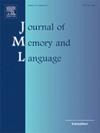Memory retrieval in discourse: Illusions of coherence during presupposition resolution
IF 3
1区 心理学
Q1 LINGUISTICS
引用次数: 0
Abstract
Syntactically inaccessible distractors can cause an illusion of grammaticality during the resolution of syntactic dependencies. At the discourse level, there is also a notion of accessibility. To what extent is this notion relevant to the processing of dependencies that go beyond the syntactic level? In three eye-tracking experiments, we studied illusion effects during presupposition resolution in short discourses. A sentence in the discourse triggered a presupposition, and a preceding sentence provided two candidate propositions for resolution: a target proposition that was accessible for presupposition resolution, and a distractor proposition that was inaccessible for the presupposition. Orthogonal to the accessibility manipulation, the two propositions could match or mismatch the semantic content of the presupposition. Experiment 1, focusing on the retrieval of gender features, showed an illusion effect by matching, but inaccessible, distractors, comparable to illusion effects in syntactic dependency resolution. In Experiment 2, which required the retrieval of compositional semantic information rather than a single feature, we replicate the finding that discourse-inaccessible information still influences memory retrieval in dependency resolution. In Experiment 3 we compared proactive and retroactive interference and demonstrated that the illusion effect is diminished or possibly even entirely disappears when the distractor is further away from the presupposition. We argue that our findings provide evidence that memory models deployed for syntactic retrieval should be extended to account for retrieval in discourses. This is challenging for most models of retrieval, more so for models that tie memory failures directly to (morpho-)syntactic structure building. We also indicate how a more general model of memory, the cue-based retrieval model, would have to be extended to capture our findings.
话语中的记忆检索:预设消解过程中的连贯幻觉
在句法依赖性的解析过程中,语法上不可接近的干扰会导致语法性的错觉。在话语层面,还有一个可达性的概念。这个概念在多大程度上与超越语法层次的依赖性处理相关?在三个眼动追踪实验中,我们研究了短语篇预设消解过程中的错觉效应。语篇中的一个句子触发了一个预设,前一个句子提供了两个候选命题:一个是目标命题,它可以被预设解决,另一个是干扰命题,它不能被预设解决。与可及性操作正交,两个命题可以匹配或不匹配预设的语义内容。实验1以性别特征检索为重点,通过匹配但不可接近的干扰物显示出错觉效应,其效果与句法依赖消解中的错觉效应相当。在实验2中,需要检索组合语义信息而不是单个特征,我们重复了在依赖关系解决中,话语不可访问信息仍然影响记忆检索的发现。在实验3中,我们比较了主动干扰和追溯干扰,并证明了当干扰物远离预设时,错觉效应减弱甚至可能完全消失。我们认为,我们的研究结果提供了证据,表明用于句法检索的记忆模型应该扩展到考虑话语中的检索。这对于大多数检索模型来说都是一个挑战,对于那些将记忆失败直接与(形态)语法结构构建联系起来的模型来说更是如此。我们还指出了一个更一般的记忆模型,即基于线索的检索模型,将如何扩展以捕捉我们的发现。
本文章由计算机程序翻译,如有差异,请以英文原文为准。
求助全文
约1分钟内获得全文
求助全文
来源期刊
CiteScore
8.70
自引率
14.00%
发文量
49
审稿时长
12.7 weeks
期刊介绍:
Articles in the Journal of Memory and Language contribute to the formulation of scientific issues and theories in the areas of memory, language comprehension and production, and cognitive processes. Special emphasis is given to research articles that provide new theoretical insights based on a carefully laid empirical foundation. The journal generally favors articles that provide multiple experiments. In addition, significant theoretical papers without new experimental findings may be published.
The Journal of Memory and Language is a valuable tool for cognitive scientists, including psychologists, linguists, and others interested in memory and learning, language, reading, and speech.
Research Areas include:
• Topics that illuminate aspects of memory or language processing
• Linguistics
• Neuropsychology.

 求助内容:
求助内容: 应助结果提醒方式:
应助结果提醒方式:


